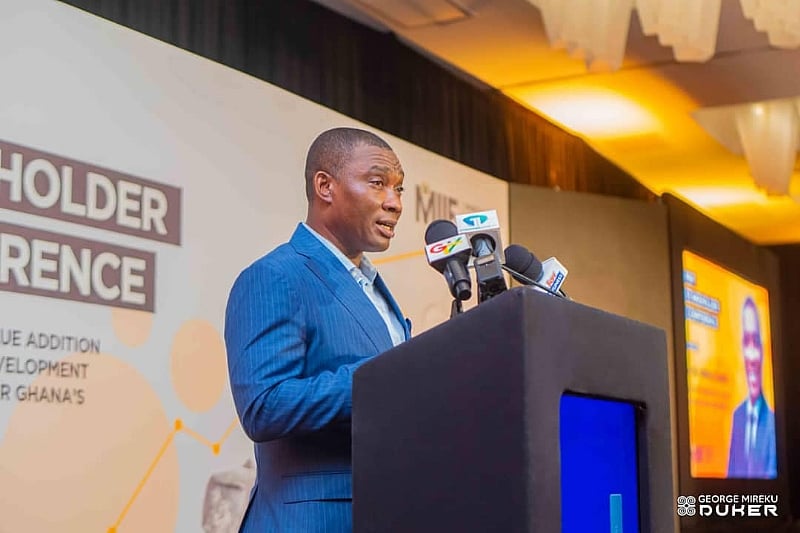The Deputy Minister for Lands and Natural Resources, Mr. George Mireku Duker, has highlighted the critical issue of gold smuggling affecting Ghana’s economy during the Second Minerals Income Investment Fund (MIIF) Stakeholders Forum held in Accra. He has called for a collaborative effort between the MIIF management and various government ministries—including National Security, Lands, and Finance—to tackle the rampant smuggling of gold. Mr. Duker pointed out that in 2022 alone, approximately 60 tonnes of gold were illicitly exported from Ghana, leading to an estimated annual loss of around US$2 billion in tax revenue for the nation due to illegal mining operations. This alarming trend jeopardizes the country’s economic stability and threatens to further exacerbate the illegal mining crisis known as galamsey.
The Deputy Minister underscored the urgent need for measures to combat the smuggling of precious minerals and its detrimental effects on Ghana’s economic landscape. He expressed concern that if this issue is left unaddressed, it could worsen the ongoing illegal mining activities, depriving the government of essential revenue. The call for action serves to highlight the multifaceted challenges that Ghana faces in managing its mineral resources effectively, balancing revenue generation with the need for regulation and law enforcement. As Ghana continues to grapple with issues related to illegal mining, Mr. Duker’s statements resonate as a plea for more robust policies to ensure the integrity of the nation’s mineral wealth.
Mr. Duker also emphasized the importance of value addition within the mining sector, challenging MIIF management to explore economically viable strategies that could enhance the benefits derived from the country’s rich mineral resources. He pointed out that value addition is often the vital link between resource-rich countries and their economically developed counterparts. By focusing on refining minerals locally instead of exporting them in raw form, Ghana could achieve higher economic returns and bolster its industries. The Deputy Minister mentioned that many countries reaping considerable benefits from minerals often lack even basic mineral endowments, indicating that technological capabilities play a critical role in value-added processes.
A principal concern raised by Mr. Duker was the limited technological resources available in Ghana for processing and refining minerals. He cautioned that without advancements in technology, the country would continue to miss out on substantial economic opportunities associated with its mineral resources. The sentiment reflects a broader narrative concerning the global economic landscape, where countries that develop skills and invest in technology can extract maximum value from their resources compared to those that primarily export raw materials. Mr. Duker’s comments arise from a recognized need for a paradigm shift towards enhancing local processing capacity to ensure that Ghana can capitalize on its mineral wealth sustainably.
In his remarks, MIIF Chief Executive Officer (CEO) Mr. Edward Nana Yaw Koranteng projected an optimistic future for the fund, highlighting plans to grow their royalty base to US$6 billion over the next decade. Mr. Koranteng indicated that with a strategic focus on expanding royalties alongside increased mineral production—particularly critical minerals such as graphite—the MIIF is positioned to significantly enhance its funding capabilities. Upon realizing such growth, the fund aims to establish more substantial avenues for reinvesting the returns into the economy, thereby promoting infrastructure development, social programs, and community initiatives.
In conclusion, the discussions held during the MIIF Stakeholders Forum reflected a comprehensive understanding of the pressing issues surrounding gold smuggling and illegal mining in Ghana. Both Mr. Duker and Mr. Koranteng underscored the imperative to improve collaboration among government agencies to combat smuggling and enhance revenue from mineral resources effectively. Additionally, the emphasis on value addition as a pathway to economic development resonated as an essential component for Ghana’s growth. By integrating technological advancements and strategic partnerships, Ghana has the potential to harness its mineral resources more effectively, ensuring long-term economic benefits and improved livelihoods for its citizens.














